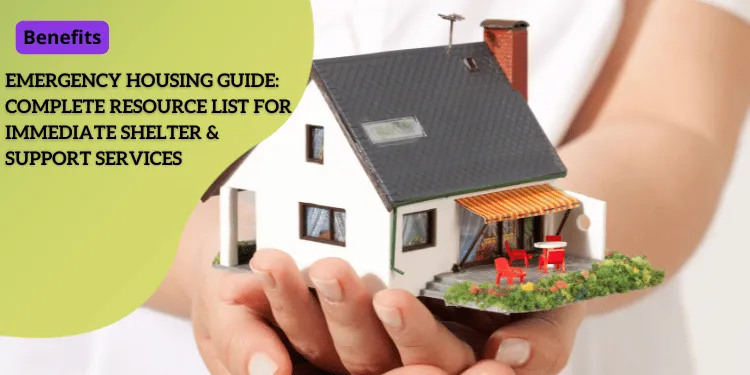Emergency Housing Guide: Complete Resource List for Immediate Shelter & Support Services

Anúncios
24/7 Access to Emergency Housing Referrals and Social Services through 211
Finding yourself in a housing crisis can be overwhelming, but immediate help is available through the 211 service.
By dialing 211, you gain 24/7 access to emergency housing referrals and essential social services.
Anúncios
This service is available in most areas across the United States, making it a reliable resource for individuals and families in dire situations.
Trained Operators Providing Personalized Guidance for Local Shelter Options
When you call 211, trained operators are ready to assist you.
Anúncios
These professionals are equipped to handle various emergencies and can offer tailored guidance on available local shelter options.
They will listen to your specific needs and direct you to shelters and organizations that can provide immediate assistance. This personalized support can make all the difference during a crisis.
Rapid Connection to Essential Resources Including Food and Mental Health Services
Beyond shelter, 211 operators can connect you to other critical resources such as food and mental health services.
This rapid connection ensures that all your immediate needs are addressed, paving the way for a more stable future.
The goal of 211 is not just to list available services but to offer comprehensive support that helps you navigate your way out of emergency circumstances.
Now that we’ve discussed the immediate help available through 211, let’s turn our attention to how the HUD programs can provide temporary housing solutions in times of crisis.
HUD Programs for Temporary Housing
Emergency Solutions Grants (ESG) Program
The Emergency Solutions Grants (ESG) program is a critical resource aimed at helping individuals and families who are experiencing homelessness.
Administered by the U.S. Department of Housing and Urban Development (HUD), the program provides essential funding to support street outreach, emergency shelters, and other vital services.
The primary goal is to stabilize individuals in crisis and aid them in finding immediate shelter.
ESG funding is distributed to local agencies, which then coordinate the delivery of services tailored to meet the needs of those in emergency situations.
The breadth of assistance offered through ESG includes rapid re-housing efforts, which help individuals move quickly into stable housing, and prevention services to avert homelessness, making it a comprehensive tool in the fight against housing crises.
State-Specific Resources Available through HUD Exchange
Navigating the landscape of temporary housing assistance can be overwhelming, especially when in urgent need.
The HUD Exchange offers a robust platform for finding state-specific resources that can streamline this process.
By accessing the HUD Exchange, individuals can search for emergency shelters and temporary housing options specific to their location.
This centralized resource hub ensures that essential information is readily available, helping individuals and families locate services quickly.
The platform’s user-friendly interface allows for easy access to a variety of housing programs and can connect users with local agencies that are funded through ESG and other HUD initiatives.
This means that regardless of where one is located, there are tailored, accessible options to address immediate housing needs.
Street Outreach and Essential Services for Crisis Stabilization
Street outreach is another pivotal component of HUD’s efforts to address homelessness.
Outreach teams, often funded by ESG grants, are dedicated to engaging with individuals living on the streets.
These teams provide essential services, including food, basic hygiene supplies, and, most importantly, information about available shelters and housing programs.
Beyond immediate needs, street outreach personnel work to build trust with homeless individuals, offering continuous support and connecting them to broader social services.
This holistic approach ensures that those experiencing homelessness have a pathway to longer-term stability and the resources they need for crisis stabilization.
Access to these comprehensive services can make all the difference for someone in a housing crisis, transforming a moment of instability into the beginning of a journey towards security.
Transitioning from temporary aid to more permanent housing solutions is the next crucial step in ensuring lasting stability.
HUD programs like the Housing Choice Voucher Program (Section 8) and Continuum of Care (CoC) play a significant role in this process, providing pathways from temporary shelters to permanent homes.
Long-Term Housing Solutions through HUD
Housing Choice Voucher Program (Section 8)
The Housing Choice Voucher Program, also known as Section 8, is a pivotal resource for securing long-term housing stability for low-income individuals and families.
This program provides rental subsidies, enabling participants to afford safe and suitable housing in the private market.
Eligibility is typically based on income, family size, and other factors.
Once accepted into the program, participants can choose their own housing, provided it meets certain health and safety standards.
The housing choice vouchers cover a portion of the rent, with the individual paying the remaining amount based on their income.
Continuum of Care (CoC) Program
The Continuum of Care (CoC) program is another essential HUD initiative designed to support individuals transitioning from homelessness to permanent housing.
CoCs coordinate a network of service providers to offer comprehensive support that includes housing assistance, case management, and access to social services.
This cohesive approach addresses the complex needs of homeless individuals and families, ensuring they receive the necessary support to move towards permanent housing.
CoCs are instrumental in creating a structured pathway that promotes long-term stability and independence.
Supportive Services
For many, securing housing is just the first step.
To ensure long-term stability, HUD provides various supportive services through its housing programs.
These services often include:
- Job Training: Helping individuals develop skills, gain employment, and become self-sufficient.
- Substance Abuse Treatment: Offering necessary treatment and recovery programs to those struggling with addiction.
- Mental Health Services: Providing access to counseling and mental health care to support emotional and psychological well-being.
- Financial Counseling: Assisting with budgeting, debt management, and financial literacy to prevent future housing instability.
These supportive services are crucial for addressing the underlying issues that may contribute to housing instability, helping individuals and families maintain their housing and improve their overall quality of life.
By leveraging these resources, participants in HUD’s programs can build a more secure and stable future.
Navigating the transition from temporary to long-term housing can be challenging.
However, with the comprehensive support offered by HUD’s programs, individuals and families have access to the essential tools and resources needed to ensure a smooth and successful journey towards permanent housing.
Youth-Specific Housing Assistance
National Runaway Safeline
For teens and young people facing the struggles of homelessness, the National Runaway Safeline stands as an essential beacon of hope.
This service offers free, confidential, and non-judgmental support 24/7, ensuring that youth have access to the help they need at any hour.
The dedicated professionals at the Safeline provide a listening ear, personalized advice, and critical resources tailored to the specific challenges young people face.
Free Transportation Services
Beyond just being there to listen, the National Runaway Safeline offers practical assistance through free transportation services.
This initiative allows youth to safely return home or move to secure, stable housing options when it’s no longer possible to stay at home.
This transportation support is crucial, acting as a bridge to safety and stability, especially when the journey home seems daunting or unattainable.
Specialized Resources and Guidance
The National Runaway Safeline also focuses on providing specialized resources and guidance tailored explicitly for homeless youth.
This means addressing not just the immediate need for shelter but also tackling the root causes of their situations.
From helping young people understand their legal rights to connecting them with local shelters and essential services, this support system is designed to help them make informed decisions.
Youth using this service can expect compassionate assistance and resources that guide them through their options, potentially including:
- Connecting to local shelters
- Assistance in understanding and exercising legal rights
- Access to other youth-specific resources aimed at creating a safe and hopeful future
This multi-faceted approach ensures that young people have the support they need to navigate their circumstances effectively, nurturing an environment where they can feel secure and optimistic about their future.
As we move forward, various other programs and resources will be explored to assist different segments of the population, each with tailored services to ensure that no one is left behind.
Veterans Housing Programs
HUD-VASH Program
The HUD-VASH Program is a collaborative initiative between the Department of Housing and Urban Development (HUD) and the Department of Veterans Affairs (VA).
This program combines HUD housing vouchers with VA supportive services to help homeless veterans and their families find and sustain permanent housing.
The vouchers make housing affordable, while VA services address the various needs of veterans, such as healthcare and employment support.
This dual approach ensures that veterans not only receive housing but also the resources needed to maintain their stability and independence.
Supportive Services for Veteran Families (SSVF)
The Supportive Services for Veteran Families (SSVF) program offers assistance to very low-income veteran families who are at risk of becoming homeless or are already homeless.
The program provides a wide range of services, including:
- Temporary financial assistance
- Housing counseling
- Connection to community resources
SSVF aims to prevent veteran families from falling into homelessness and to quickly rehouse those who have lost their homes.
By addressing both immediate needs and long-term stability, SSVF plays a crucial role in ensuring veteran families can lead secure and self-sufficient lives.
Grant and Per Diem (GPD) Program
The Grant and Per Diem (GPD) program funds community agencies that provide services to homeless veterans.
These grants support transitional housing and case management services, facilitating the transition from homelessness to permanent housing.
The program encompasses comprehensive support services such as:
- Case management to help veterans navigate housing options and obtain benefits
- Access to medical, mental health, and substance use treatment through VA hospitals and clinics
- Education and training programs to enhance job skills and employment opportunities
These services ensure that veterans have the support they need to achieve stability and independence.
Comprehensive Support Services
Beyond housing, the VA offers a range of supportive services to help veterans stabilize their lives.
These include:
- Case Management: Personalized support to assist veterans in navigating housing options, accessing benefits, and connecting with employment opportunities.
- Health Care: Access to medical, mental health, and substance use treatment through VA hospitals and clinics.
- Education and Training: Programs offering job training, resume assistance, and educational resources to enhance long-term stability.
By leveraging these resources, veterans can find a pathway to secure and stable housing, rebuild their lives, and achieve lasting self-sufficiency.
As we continue to explore the different resources available, we will next delve into prevention and stability resources to help prevent future homelessness.
Prevention and Stability Resources
Access to Housing Counselors for Personalized Guidance and Planning
Housing counselors play a crucial role in helping individuals and families achieve housing stability.
These trained professionals offer personalized guidance tailored to your unique situation.
For instance, housing counselors can assist in navigating the complexities of housing applications, understanding tenant rights, and locating housing grants.
By meeting with a counselor, you can develop a strategic plan to secure and maintain stable housing.
Financial Education Programs
Financial stability is a key component in preventing future homelessness.
Various programs offer financial education tailored to individuals at risk.
These programs focus on:
- Budgeting Workshops: Learn how to manage your money effectively, prioritize expenses, and save for emergencies.
- Credit Counseling: Understand your credit score and work on improving it to access better housing options.
- Debt Management: Get assistance in managing and reducing debt, which can alleviate financial stress and make housing more affordable.
Employment Assistance Programs
Stable employment is vital for maintaining housing.
Programs that provide employment assistance include:
- Job Training: Gain skills that are in demand in the job market, increasing your employability and earning potential.
- Resume Assistance: Get help crafting a professional resume that highlights your strengths and experiences.
- Job Placement Services: Access networks and connections that can lead to employment opportunities.
Ongoing Support Services
To ensure long-term housing stability, ongoing support services are essential:
- Case Management: Personalized support to help you stay on track with your housing plan, access benefits, and deal with any issues that arise.
- Access to Social Services: Connection to food, healthcare, and other essential services to support your overall well-being.
- Substance Abuse Treatment and Mental Health Services: Programs to address any underlying issues that may affect your ability to maintain housing.
Leveraging these resources can help you achieve and sustain a stable, secure living situation.
Proactive engagement with financial education and employment assistance programs lays a strong foundation for long-term stability.
Continuous access to support services ensures that you have a safety net, helping prevent future episodes of homelessness.
These preventive measures are crucial for fostering a stable and secure housing environment.
Empowered by these resources, you can navigate any challenges and work towards a brighter future.






